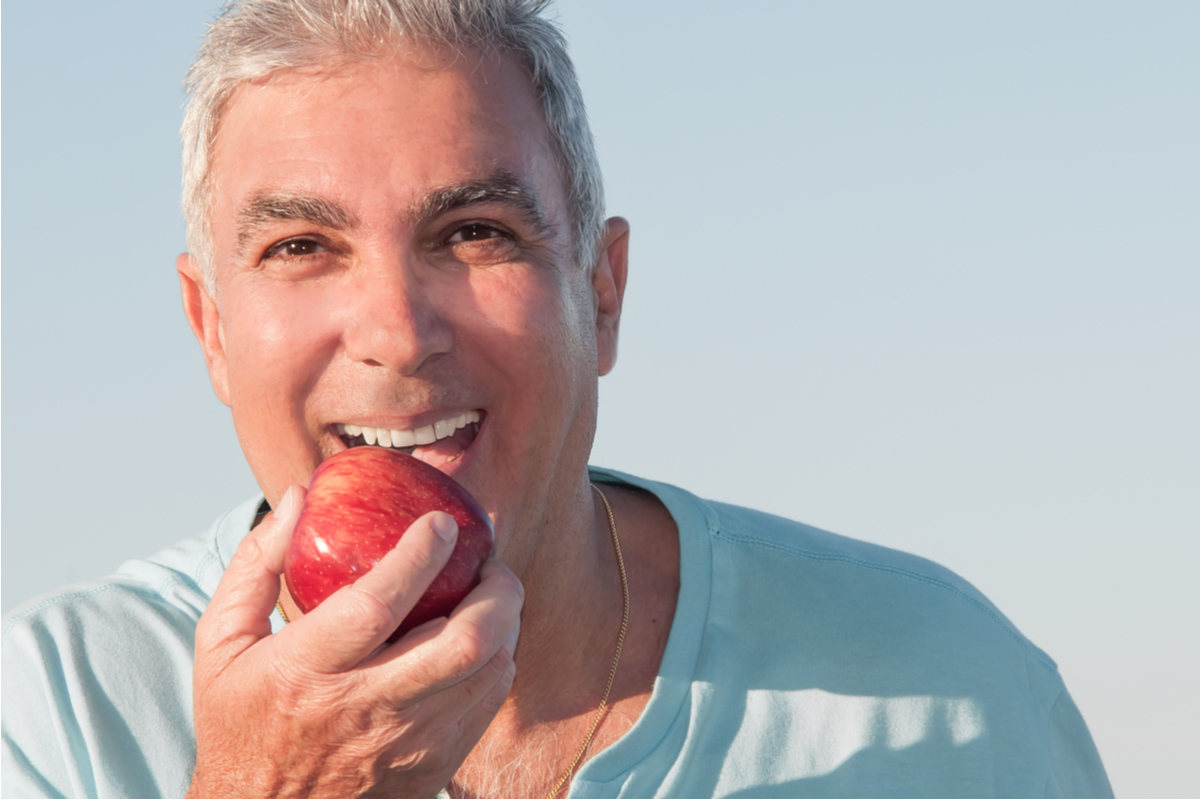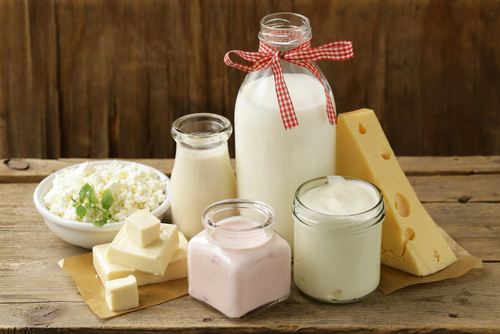You are what you eat; and this is particularly true for your teeth and gums.
Those starchy or sugary foods we love are also loved by the bacteria in our mouth. However, we well know that they cause tooth decay and gum disease.
Another good reason to stay away from them!
Anyway, back to our teeth and gums…
The difference between healthy 32’s and frequent visits to the dentist has a lot to do with our diet. Even with a good oral hygiene routine (brushing twice a day, flossing once a day), it can still be hard to keep our teeth in great shape over the long term.
Eating a variety of nutrient-rich foods from all the food groups promotes healthy teeth and gums. This means maintain a balanced diet of fruits, vegetables, protein foods, calcium-rich foods and whole grains for a healthy smile as well as a healthy body.
So, which foods are best for teeth and gum health?
Fresh fruits and veggies because of their high nutritional value and added teeth cleaning benefits are your best choices.
Then, there are also calcium-rich foods, such as low-fat or fat-free milk, yogurt and cheese, fortified soy drinks, tofu, canned salmon, almonds and dark green leafy vegetables that help promote strong teeth and bones.
Chewing on crunchy foods gets the saliva going, which along with water, helps to wash away plaque causing bacteria and food particles.
Cheese, Milk, and Yogurt
Cheese is one of the best foods for healthy teeth for a number of reasons. First, it is low in sugar and high in calcium. Cheese contains casein, which is a protein that is particularly useful for fortifying tooth enamel. It is high in calcium, which is important for maintaining bone density. Cheese is also high in phosphate content, which helps balance pH levels in the mouth, which helps to preserve tooth enamel. Another great reason cheese is a friend to our teeth is that chewing it increases saliva production, which helps to wash away bacteria in the mouth.
Aside from good old fashioned fluoridated water, milk is the best drink when it comes to your teeth. It’s rich in calcium and other important elements. Milk, like cheese, also lowers the acid levels in the mouth, which helps fighting tooth decay.
Yogurt is packed with calcium and probiotics that protect you against cavities, gum disease and even bad breath.
Water
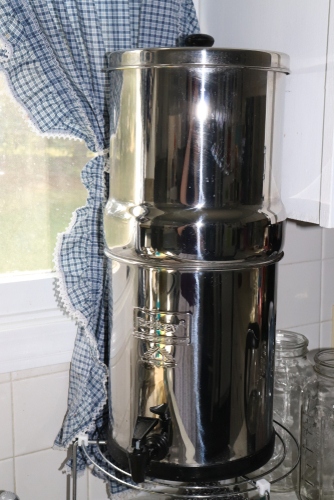 Water is unlike any other drink, and is by far the healthiest drink available. Our bodies are made of 60% – 70% water, and staying hydrated helps your system distribute healthy nutrients, gets rid of waste, gives your skin a healthy glow and keeps your muscles moving.
Water is unlike any other drink, and is by far the healthiest drink available. Our bodies are made of 60% – 70% water, and staying hydrated helps your system distribute healthy nutrients, gets rid of waste, gives your skin a healthy glow and keeps your muscles moving.
And–drinking water really helps your teeth stay health – especially if it’s fluoridated. Drinking water with fluoride, which is “nature’s cavity fighter,” is one of the easiest and most beneficial things you can do to help prevent cavities. And, water helps wash away food particles and keeps your saliva levels high.
Celery, Carrots, and Other Crunchy Veggies
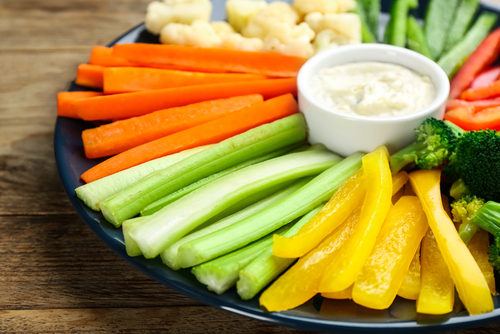 Many vegetables are good for teeth because they require a lot of chewing to clean teeth surfaces. Crunchy, firm foods that contain lots of water are great natural teeth cleaners because they stimulate the flow of saliva, which helps to scrub away food particles and bacteria. These fresh crunchy veggies are usually also packed with some of the most important minerals and vitamins for your mouth.
Many vegetables are good for teeth because they require a lot of chewing to clean teeth surfaces. Crunchy, firm foods that contain lots of water are great natural teeth cleaners because they stimulate the flow of saliva, which helps to scrub away food particles and bacteria. These fresh crunchy veggies are usually also packed with some of the most important minerals and vitamins for your mouth.
Celery is probably the closest thing to nature’s dental floss. The crunchy and fibrous texture makes for a very effective natural teeth cleaner.
In addition to packing lots of nutrients, carrots are also one of the great cavity-fighting vegetables. Carrots contain lots of vitamin C, calcium and keratins which all offer dental benefits. Eating fresh carrots also helps to clean your teeth – like a natural toothbrush. When combined with your saliva, carrots help to wash away stain-causing bacteria and food particles.
Leafy Greens (Spinach, Lettuce, Kale)
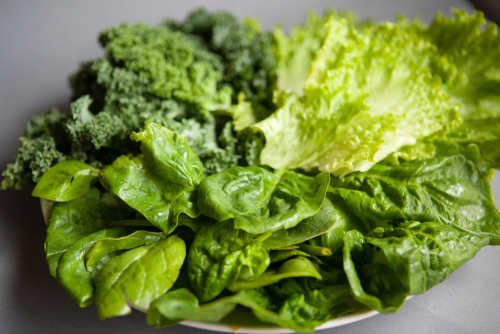 Super healthy, leafy greens are rich in calcium, folic acid and lots of important vitamins and minerals that your teeth and gums love. Crunchy fresh greens in salads and sandwiches also help in cleaning your teeth.
Super healthy, leafy greens are rich in calcium, folic acid and lots of important vitamins and minerals that your teeth and gums love. Crunchy fresh greens in salads and sandwiches also help in cleaning your teeth.
Strawberries – and Other Vitamin C Rich Berries
 We all know that vitamin C is good for the body because of its antioxidant properties and for growth and repair of tissues in all parts of your body. This also true for teeth. The collagen in the dentin of teeth depends on vitamin C for maintaining its strength and structure through synthesis.
We all know that vitamin C is good for the body because of its antioxidant properties and for growth and repair of tissues in all parts of your body. This also true for teeth. The collagen in the dentin of teeth depends on vitamin C for maintaining its strength and structure through synthesis.
Strawberries are packed with Vitamin C, antioxidants and also malic acid, which could even naturally whiten your teeth. Be sure your diet includes fresh fruits and veggies rich in vitamin C, such as apples, pears, strawberries, pineapples, tomatoes, broccoli, bell peppers, and cucumbers.
Apples and Pears
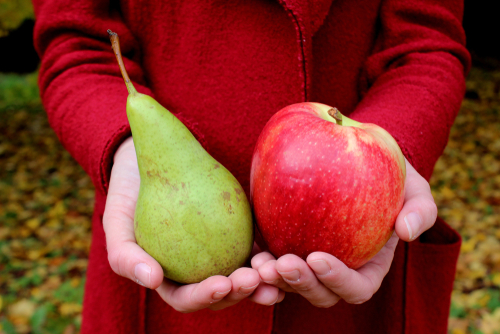 Will an apple a day keep the dentist away? Maybe not, but it will certainly help. Eating apples or other hard fibrous fruits can help clean your teeth and increases salivation, which can neutralize the citric and malic acids left behind in your mouth. And while sugary apple juice may contribute to tooth decay, fresh apples are less likely to cause problems. This is because chewing the fibrous texture of apples stimulates your gums, further reducing cavity-causing bacteria and increasing saliva flow.
Will an apple a day keep the dentist away? Maybe not, but it will certainly help. Eating apples or other hard fibrous fruits can help clean your teeth and increases salivation, which can neutralize the citric and malic acids left behind in your mouth. And while sugary apple juice may contribute to tooth decay, fresh apples are less likely to cause problems. This is because chewing the fibrous texture of apples stimulates your gums, further reducing cavity-causing bacteria and increasing saliva flow.
Unlike many acidic fruits, raw pears are good at neutralizing acids in your mouth that cause decay.
Nuts
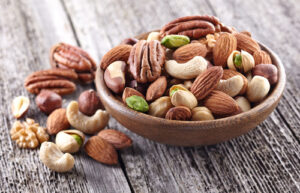 Nuts are full of health benefits for your teeth. They are packed with tons of important elements like calcium and phosphorus. Especially beneficial are almonds, Brazil nuts and cashews, which help to fight bacteria that lead to tooth decay. For instance, peanuts are a great source of calcium and vitamin D, and almonds offer good amounts of calcium, which is beneficial to teeth and gums. Cashews are known to stimulate saliva and walnuts contain everything from fibre, folic acid, iron, thiamine, magnesium, iron, niacin, vitamin E, vitamin B6, potassium and zinc.
Nuts are full of health benefits for your teeth. They are packed with tons of important elements like calcium and phosphorus. Especially beneficial are almonds, Brazil nuts and cashews, which help to fight bacteria that lead to tooth decay. For instance, peanuts are a great source of calcium and vitamin D, and almonds offer good amounts of calcium, which is beneficial to teeth and gums. Cashews are known to stimulate saliva and walnuts contain everything from fibre, folic acid, iron, thiamine, magnesium, iron, niacin, vitamin E, vitamin B6, potassium and zinc.
Cranberries and Raisins (Fresh or Sugar Free)
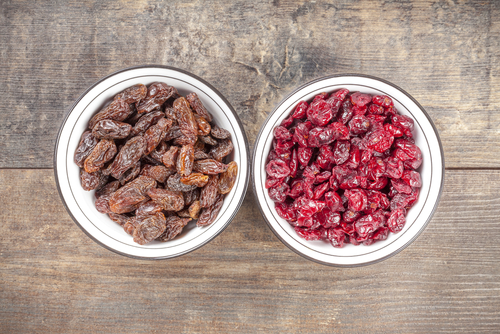 Cranberries are also rich in polyphenols (just like tea) and provide antioxidant benefits. Fresh cranberries are especially effective at disrupting the process of plaque formation.
Cranberries are also rich in polyphenols (just like tea) and provide antioxidant benefits. Fresh cranberries are especially effective at disrupting the process of plaque formation.
Just be aware that some packaged dried cranberries contain a lot of added sugar that isn’t so good for teeth.
There is a long-held perception that raisins promote cavities. However, one study suggests that compounds in raisins may actually fight tooth decay.
Phytochemicals are antioxidants found in plants.
One of the five phytochemicals the study identified in raisins is oleanolic acid. In the study, oleanolic acid inhibited the growth of two species of oral bacteria: Streptococcus mutans, which causes cavities, and Porphyromonas gingivalis, which causes periodontal disease.
Phytochemicals such as oleanolic acid in raisins suppress the growth of oral bacteria associated with cavities and gum disease, according to the study. “Phytochemicals in raisins may benefit oral health by fighting bacteria that cause cavities and gum disease,” says Dr Christine Wu, lead author of the study.
Tea and Coffee
 We’ve written extensively about polyphenols. Polyphenols are a category of chemicals that naturally occur in many of the foods and drinks we consume, including teas and coffee. They offer several health benefits, including their role as antioxidants, which can combat cell damage, as well as their effects on reducing inflammation and helping to fight cancer. Green and black teas are rich in polyphenols and offers a number of other health benefits.
We’ve written extensively about polyphenols. Polyphenols are a category of chemicals that naturally occur in many of the foods and drinks we consume, including teas and coffee. They offer several health benefits, including their role as antioxidants, which can combat cell damage, as well as their effects on reducing inflammation and helping to fight cancer. Green and black teas are rich in polyphenols and offers a number of other health benefits.
Garlic and Onions
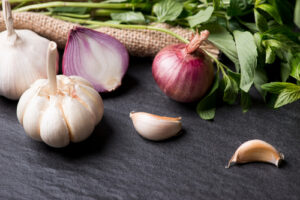 Okay, maybe garlic isn’t a go-to for fresh breath. However, the allicin that is contained in garlic has strong antimicrobial properties, which can help fight tooth decay and especially periodontal disease.
Okay, maybe garlic isn’t a go-to for fresh breath. However, the allicin that is contained in garlic has strong antimicrobial properties, which can help fight tooth decay and especially periodontal disease.
Again, maybe not the first choice for fresh breath. When eaten raw, onions have powerful antibacterial properties especially against some of the bacteria that causes cavities and gum disease.
Whole Grains
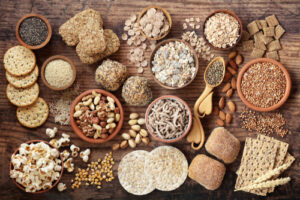 While it’s true that simple carbohydrates can stick to your teeth and contribute to the formation of cavities, that’s not the case for whole grains. Whole wheat bread and pasta, brown rice, oatmeal and other whole grains are healthier choices because they have complex carbohydrates which give bacteria less digestible food for them to grow. Plus, they offer plenty of other nutrients that actively help your teeth and gums to stay healthy.
While it’s true that simple carbohydrates can stick to your teeth and contribute to the formation of cavities, that’s not the case for whole grains. Whole wheat bread and pasta, brown rice, oatmeal and other whole grains are healthier choices because they have complex carbohydrates which give bacteria less digestible food for them to grow. Plus, they offer plenty of other nutrients that actively help your teeth and gums to stay healthy.
Shiitake Mushrooms
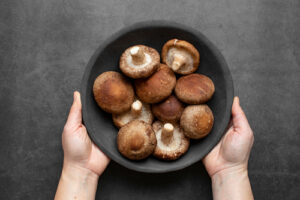 These mushrooms pack a bold flavour, and offer anti-microbial properties for fighting tooth decay. Researchers have found that shitake mushrooms contain a poly-saccharide called lentinan, which prevents the growth of bacteria in the mouth.
These mushrooms pack a bold flavour, and offer anti-microbial properties for fighting tooth decay. Researchers have found that shitake mushrooms contain a poly-saccharide called lentinan, which prevents the growth of bacteria in the mouth.
Chewing Gum
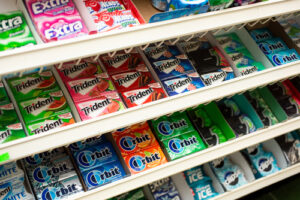 Okay so this is technically not a food. But chewing sugarless gum can be helpful for keeping your teeth clean by dislodging uneaten food and increasing saliva flow to neutralise the acids in your mouth. Some gums claim they contain tooth-whitening ingredients, some even claim to have cavity-reducing properties that can heal areas on the teeth where cavities are forming.
Okay so this is technically not a food. But chewing sugarless gum can be helpful for keeping your teeth clean by dislodging uneaten food and increasing saliva flow to neutralise the acids in your mouth. Some gums claim they contain tooth-whitening ingredients, some even claim to have cavity-reducing properties that can heal areas on the teeth where cavities are forming.
Remember a few key points:
Healthy Balance is the Key
As with good overall health, maintaining good dental health, means eating a variety of foods from each of the five major food groups, and drinking plenty of fluoridated water.
Timing is Important
A diet that promotes good oral health is not just about the foods you eat or avoid — when and how you eat them is equally important. One way to protect your teeth is by eating raw foods at the end of meals. Such foods help clean teeth and massage gums, and generate more saliva to wash away extra food particles left after a meal.
Rinse after meals
It’s a good idea to gargle after eating. You could add a mouth rinse if you feel like freshening up your breath.
Try eating acid neutralizing foods after a sweet meal or desert will prevent prolonged acid attacks to your teeth and therefore help prevent cavities. The best examples are milk, unsweetened tea or cheese.
Also, be sure to drink plenty of water during and after meals to help wash away sugars and acids left from snacks and meals.
Article credits : University of Illinois – College of Dentistry
Also Read –



